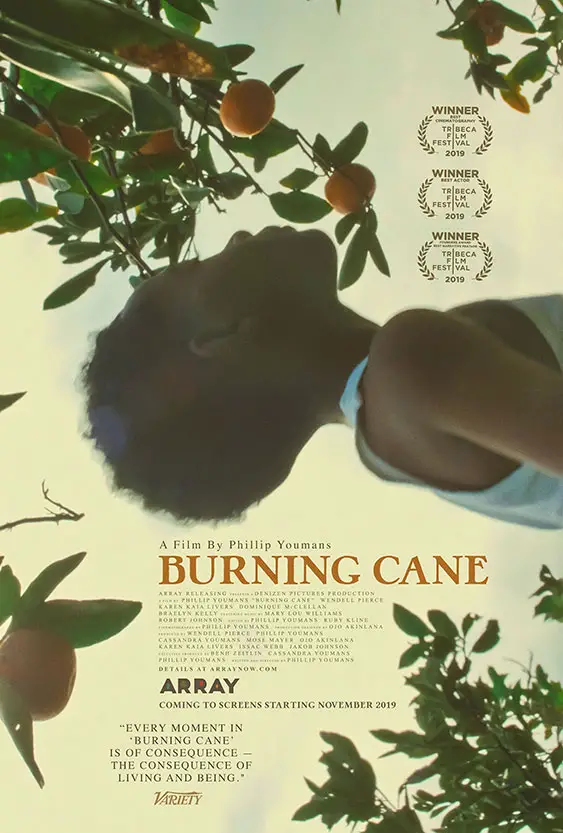
Next, the film pivots to Daniel. He, too, is a lost man. He lost his job, and he is desperately looking for a new one, but his alcoholism handicaps him. Daniel spends his days at home fixing things around the house, doing dishes, or other “housework”–all while drinking and smoking way too much. He also takes care of Jeremiah the best he can, but sadly this is not the most suitable environment for a child. Like most in the film, we can tell that “life” was maybe against him from the start. However, there might be hope as we can see that, despite all his flaws, he is an ill-equipped but dedicated and loving father. For example, there is a truly lovely depiction of father-son bonding time, when the two are listening to music and dancing, but it is counterbalanced by a scene of him senselessly attempting to give alcohol to his kid.
It also doesn’t help that he is abusive and, like the old-school, macho world he lives in, cannot accept that his wife (Emyri Crutchfield) is the one supporting the family. She is obviously not happy about the situation, as they are barely able to make ends meet, and she has to come home to a drunk husband who can become an extremely violent one.
“The film opens on shots of cane fields burning under a soft sunlight promising beautiful cinematography and poetic mood.”
Sadly, there is not a single good relationship involving healthy adults in this film as they are all broken in a broken system. They live in a world where domestic violence, poverty, alcohol abuse, and possible malnutrition, are the norms (as we often see the dad cooking for his son, but not very balanced meals). Viewers might even feel the sensation of sickness from all the cheap beers, hard liquor, and intoxicating cigarette smoke that makes the characters constantly coughing, vomiting, and/or in bad physical shape. Sure the matriarchal figure is holding – or more accurately, trying to hold – the community together, by caring for others, but she herself might not be absolved of all problems. Like often seen on screen, the only “pure soul” is the kid. Jeremiah is always attentive and quiet (maybe even too withdrawn), always in his coloring books, watching TV, or obediently – and powerlessly – doing what his father drunkenly told him to do. Maybe he represents a metaphor, as unlike the young boy still dreaming and hoping for a better future, and everybody else appears to have lost hope, faith in society and humanity, or everything else, except maybe religion. Still, the later seems like a test even for a man of God like the Tillman, who made us wonder if he believes what he fervently preaches.
We might not necessarily know how the people portrayed arrived at this point in their lives, but the film really captured their essences in merely a few scenes. These folks seem real and are full-fledged.
One might be right to believe that Burning Cane works best as vignettes of a could-be typical Black family living in a small town of rural South. It could also be seen as an ode to a people, their states, feelings, doubts, personal struggles, and in the background, one might read the connection to the land and its history.

"…a man of God like the Tillman, who made us wonder if he believes what he fervently preaches."

This film had too many loose ends to make any kind of connections to draw a reasonable conclusion, like what happened to Daniel’s wife? Did Helen kill Daniel or herself? And why did Helen think murder/suicide were options? Did the pastor kill his wife in a drunken rage? With all the unanswered questions the film wasn’t enjoyable.
If you seen it from the beginning “Chemicals not working”
So, that tells me she is burning a body in the sugar cane fields.
Son, killed is girlfriend. Son goes home to mom and confessed. Instead of mom turning him in to the police she gets advice from the Preacher man.
She prayed about it before shooting her son in the bed room. That was DEEP! I believed that’s what she was burning in the fields.
In the end??? Who did she shoot ? And did her son kill his wife?
I actually enjoyed the movie… The realism interested me. I am confused about the end howeVer. Did she shoot her son or what happened at the close of the last scene?
I was not at all sure but I too thought that Helen was going to shoot her son Daniel. And I believe the reason is that Daniel has killed his wife, although that’s not clear. I assumed that was what Helen talked about with the Pastor who advised she keep the whole matter private.
I tend to agree with christopher turner. But, I don’t like films that force one to make up his own ending….